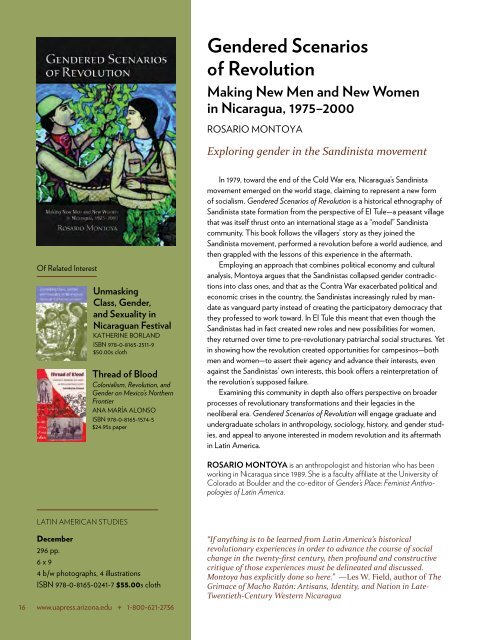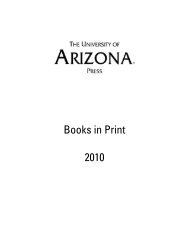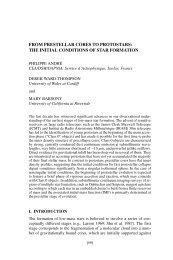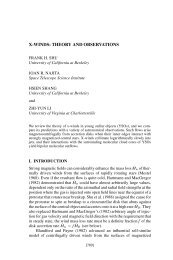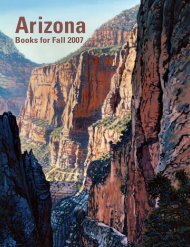Fall 2012 - The University of Arizona Press
Fall 2012 - The University of Arizona Press
Fall 2012 - The University of Arizona Press
Create successful ePaper yourself
Turn your PDF publications into a flip-book with our unique Google optimized e-Paper software.
Gendered Scenarios<br />
<strong>of</strong> Revolution<br />
Making New Men and New Women<br />
in Nicaragua, 1975–2000<br />
Rosario Montoya<br />
Exploring gender in the Sandinista movement<br />
Of Related Interest<br />
Unmasking<br />
Class, Gender,<br />
and Sexuality in<br />
Nicaraguan Festival<br />
Katherine Borland<br />
ISBN 978-0-8165-2511-9<br />
$50.00s cloth<br />
Thread <strong>of</strong> Blood<br />
Colonialism, Revolution, and<br />
Gender on Mexico’s Northern<br />
Frontier<br />
Ana María Alonso<br />
ISBN 978-0-8165-1574-5<br />
$24.95s paper<br />
In 1979, toward the end <strong>of</strong> the Cold War era, Nicaragua’s Sandinista<br />
movement emerged on the world stage, claiming to represent a new form<br />
<strong>of</strong> socialism. Gendered Scenarios <strong>of</strong> Revolution is a historical ethnography <strong>of</strong><br />
Sandinista state formation from the perspective <strong>of</strong> El Tule—a peasant village<br />
that was itself thrust onto an international stage as a “model” Sandinista<br />
community. This book follows the villagers’ story as they joined the<br />
Sandinista movement, performed a revolution before a world audience, and<br />
then grappled with the lessons <strong>of</strong> this experience in the aftermath.<br />
Employing an approach that combines political economy and cultural<br />
analysis, Montoya argues that the Sandinistas collapsed gender contradictions<br />
into class ones, and that as the Contra War exacerbated political and<br />
economic crises in the country, the Sandinistas increasingly ruled by mandate<br />
as vanguard party instead <strong>of</strong> creating the participatory democracy that<br />
they pr<strong>of</strong>essed to work toward. In El Tule this meant that even though the<br />
Sandinistas had in fact created new roles and new possibilities for women,<br />
they returned over time to pre-revolutionary patriarchal social structures. Yet<br />
in showing how the revolution created opportunities for campesinos—both<br />
men and women—to assert their agency and advance their interests, even<br />
against the Sandinistas’ own interests, this book <strong>of</strong>fers a reinterpretation <strong>of</strong><br />
the revolution’s supposed failure.<br />
Examining this community in depth also <strong>of</strong>fers perspective on broader<br />
processes <strong>of</strong> revolutionary transformations and their legacies in the<br />
neoliberal era. Gendered Scenarios <strong>of</strong> Revolution will engage graduate and<br />
undergraduate scholars in anthropology, sociology, history, and gender studies,<br />
and appeal to anyone interested in modern revolution and its aftermath<br />
in Latin America.<br />
Rosario Montoya is an anthropologist and historian who has been<br />
working in Nicaragua since 1989. She is a faculty affiliate at the <strong>University</strong> <strong>of</strong><br />
Colorado at Boulder and the co-editor <strong>of</strong> Gender’s Place: Feminist Anthropologies<br />
<strong>of</strong> Latin America.<br />
Latin AMeRIcan stUDIes<br />
December<br />
296 pp.<br />
6 x 9<br />
4 b/w photographs, 4 illustrations<br />
ISBN 978-0-8165-0241-7 $55.00s cloth<br />
16 www.uapress.arizona.edu W 1-800-621-2736<br />
“If anything is to be learned from Latin America’s historical<br />
revolutionary experiences in order to advance the course <strong>of</strong> social<br />
change in the twenty-first century, then pr<strong>of</strong>ound and constructive<br />
critique <strong>of</strong> those experiences must be delineated and discussed.<br />
Montoya has explicitly done so here.” —Les W. Field, author <strong>of</strong> <strong>The</strong><br />
Grimace <strong>of</strong> Macho Ratón: Artisans, Identity, and Nation in Late-<br />
Twentieth-Century Western Nicaragua


